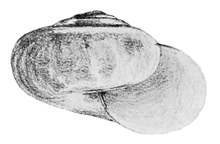Staffordia toruputuensis
| Staffordia toruputuensis | |
|---|---|

| |
| drawing of apertural view of the shell of Staffordia toruputuensis | |
| Scientific classification | |
| Kingdom: | |
| Phylum: | |
| Class: | |
| (unranked): | clade Heterobranchia
clade Euthyneura clade Panpulmonata clade Eupulmonata clade Stylommatophora informal group Sigmurethra clade limacoid clade |
| Superfamily: | |
| Family: | |
| Genus: | |
| Species: | S. toruputuensis
|
| Binomial name | |
| Staffordia toruputuensis | |
Staffordia toruputuensis is a species of air-breathing land snail, terrestrial pulmonate gastropod mollusk in the family Staffordiidae.
The specific name toruputuensis is apparently according to its type locality, Toruputu Peak.
Distribution
The type locality of this species is "Toruputu Peak".[1] The altitude was not speciefied, but it can vary from 1750 m (birdwatching of the same author)[2] to 7,000 feet (2,100 m) (locality of related species Staffordia staffordi).[1] It is in Dafla Hills in India, because whole family Staffordiidae is endemic to Dafla Hills.[3]
Description
The shell is globose with oblique columellar margin.[1] The shell of the type specimen is not fully grown.[1] The sculpture is very smooth, with a thick shining epidermis with indistinct striation.[1] The color is light ochraceous olive-green.[1]
The width of the shell is 14.0-16.5 mm.[1] The height of the shell is 7.25 mm.[1]
References
This article incorporates public domain text from the reference.[1]
- ^ a b c d e f g h i Godwin-Austen H. H. (1907). Land and freshwater mollusca of India, including South Arabia, Baluchistan, Afghanistan, Kashmir, Nepal, Burma, Pegu, Tenasserim, Malaya Peninsula, Ceylon and other islands of the Indian Ocean; Supplementary to Masers Theobald and Hanley's Conchologica Indica. Taylor and Francis, London. 2: page 185, plate CXIII, figure 3.
- ^ "BEAUTIFUL NUTHATCH Sitta formosa". page 2279. In: Threatened birds of Asia. PDF.
- ^ Hausdorf B. (2000). "Biogeography of the Limacoidea sensu lato (Gastropoda: Stylommatophora): Vicariance Events and Long-Distance Dispersal". Journal of Biogeography 27(2): 379-390. doi:10.1046/j.1365-2699.2000.00403.x, JSTOR.
